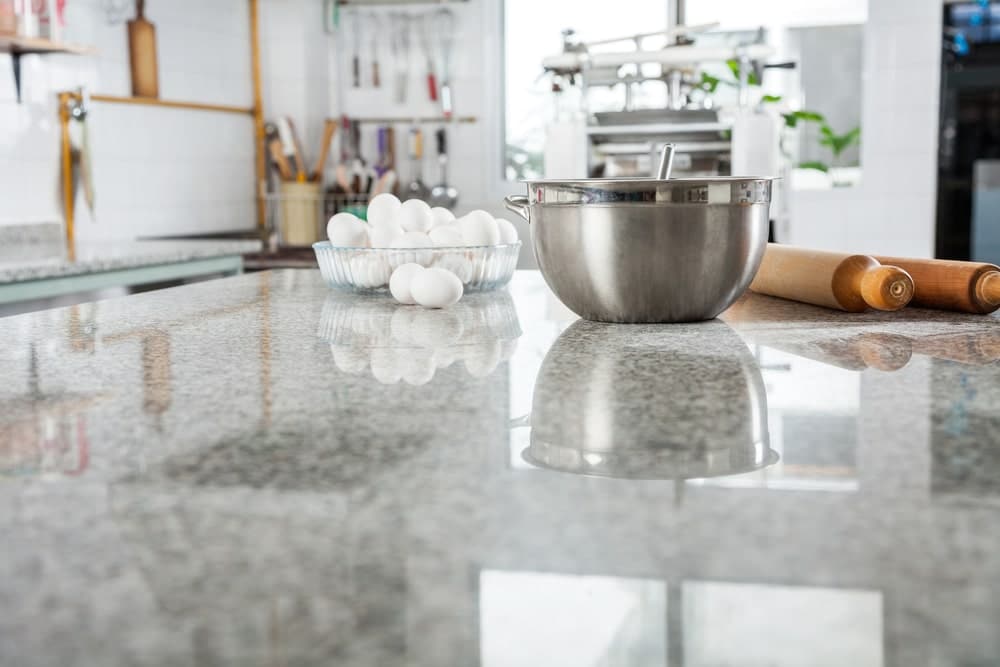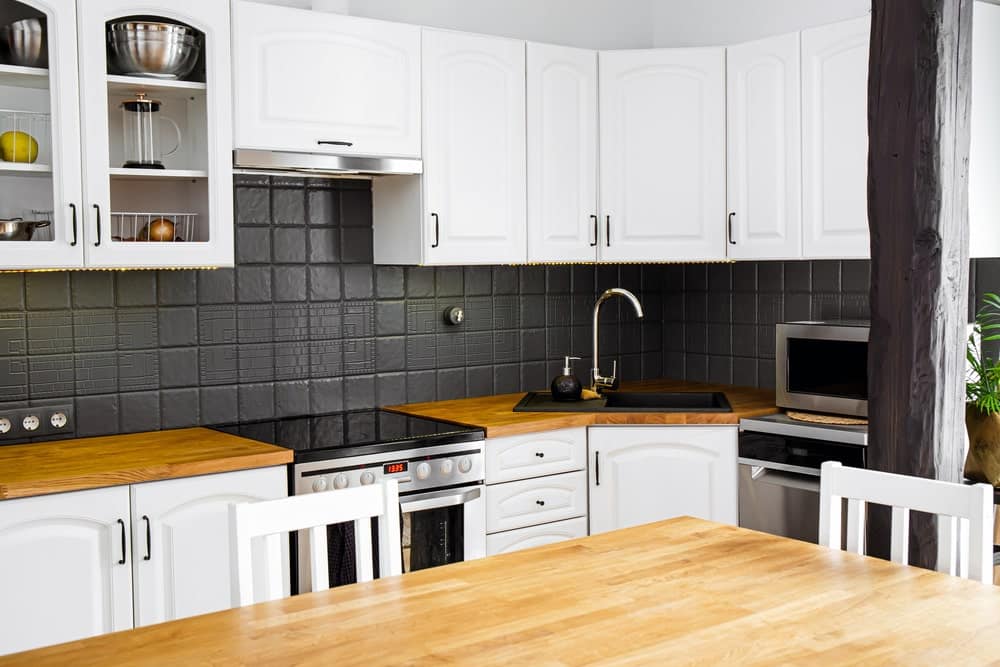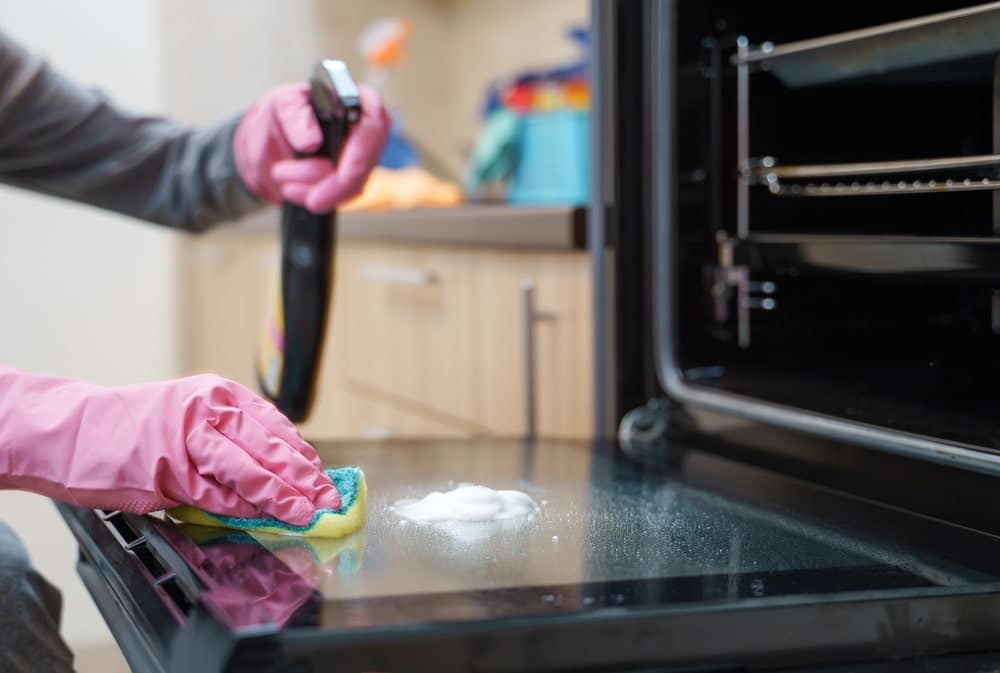
The Unintended Consequences of Oven Cleaner Use
Oven cleaner is a powerful cleaning substance that removes tough grease and food stains.
These cleaners can be destructive on surfaces that aren’t made of sturdy oven materials. They may remove stubborn stains, but most oven cleaners can also cause irreparable damage.
Your oven is made of galvanized or stainless steel and is given a coating of acrylic enamel that is incredibly hard to break down. While your oven may be able to withstand the harsh chemicals found in oven cleaners, your countertops were not designed for that.
The Effect of Oven Cleaners on Different Countertop Materials
Stone Countertops
These materials are prone to tarnish when they’re exposed to abrasive cleaners. However, natural stone counters will withstand the effects better than manufactured stone counters.
Natural stone countertops protect against much more because they haven’t been changed from their natural state and turned into a composite of something else.
Quartz is an engineered material with the highest risk of degrading and losing color when exposed to sodium hydroxide, so don’t feel tempted to clean quartz countertops with oven cleaners.
Table of Contents
Granite Countertops
There are a lot of perks to installing a granite countertop. Granite is perhaps the hardest, most durable countertop material available.
Even though you may have solid surface countertops, you should still not use toxic chemicals on them.
The effect of oven cleaners on your kitchen counters is always negative. The chemicals will eat away at the seal on the granite until you have exposed rock.
Tile Countertops
Tile countertops aren’t as popular today as the beautiful countertops of granite and marble, but they’re often found in older homes and are beloved for their retro look.
Many homeowners think they can use a heavy-duty oven cleaner on tiles because they need something strong to remove stains.
This is not the case.
They will end up doing more harm than good. Oven cleaners can eat away at the top finish of the tile and deteriorate the grout over time.
Stainless Steel Countertops
In modern kitchens and professional eateries, stainless steel countertops are a popular choice.
Since they look like the inside of an oven, you might be tempted to try cleaning them with harsh chemicals. However, instead of removing stubborn stains, this can cause staining to appear on the surface.
On top of the damage these chemicals can do, the kitchen surface can hold onto those harmful chemicals, transfer them into food, and create health hazards.
Formica Countertops
Formica was originally the company that created laminate countertops. Over time, “Formica” became the unofficial name for any laminate-type countertops.
Formica countertops are a popular choice for those on a tight budget. They’re low maintenance and do a good job resisting scratches and stains.
They still cannot withstand the powerful chemicals of oven cleaners. Laminate counters can fade and lose color and finish when oven cleaners are used on them, so it’s not worth the risk.

Wooden Countertops & Butcher’s Blocks
Wood countertops are beautiful, but they don’t stand a chance. There isn’t a wood countertop out there that can stand up to the intensely harsh chemicals of oven cleaners.
The cleaner will first eat away at any protective coating, and it may even look like you’ve been left with clean countertops. However, once that protective coating has fully dissolved (which won’t take long), it will start leaving permanent stains on your wood counters.
Potential Hazards of Oven Cleaners on Kitchen Countertops
Surface Discoloration
On light-colored quartz countertops, for example, chemical reactions may leave behind white marks, splotches, and dull spots that can’t be missed. Even with stain removers or rubbing alcohol, it can be challenging to eliminate the damage of a chemical reaction.
Etching or Staining
Even steel counters can find themselves with spots that have been eaten away by harsh chemicals. Granite or marble countertops are often victims of etching from exposure to corrosive chemicals.
Etching looks like lighter color patches scattered somewhat sporadically across your kitchen countertops. If you want to correct significant etching or staining on your counters, it usually means hiring a contractor. However, if it’s not too significant, you can usually buff it out yourself.
Chemical Burns
Chemical burns can happen on any kind of kitchen counter, and you’ll know them when you see them. They come from cleaners that are too harsh for certain materials. Oven cleaners are a huge culprit of chemical burns.
Chemical burns come in all kinds of shapes and sizes, but should a burn occur, you can likely catch it while it’s small.
Making these burns go away usually involves stripping the protective finish and applying a new sealant and wax. That is a process you can do yourself when working with a small counter, but larger counters should probably be hired out.
Material Weakening
Over time, chemicals will destroy layer after layer of your countertops until the strength is significantly less. You may not notice it until it has severely damaged the durability of your countertops, but hopefully, that is not the case.
Getting the food splatters off isn’t worth the damage you will do by using oven cleaners or other corrosive chemicals.
Permanent Damage
If you continue to use oven cleaners on your countertops, you will eventually damage them beyond repair. Once you hit that point, a remodel will be necessary if you want nice counters again.
If it’s cosmetic damage, you could potentially seal it up and move on until you have the time, money, and convenience. However, if it’s structural, that’s when things get a little dicey. You don’t want to work with countertops or cabinets that are likely to give out on you. It is best to get those replaced before something else gets destroyed.
It is highly recommended that you find other avenues to pursue when it comes to cleaning. There are more options, including natural cleaners that we will discuss here.
Kitchen Countertop-Friendly Cleaning Alternatives
Mild Dish Soap and Water
Any mild dish soap that you use on your dishes and hands is safe for your countertops, which means you always have a cleaner on hand.
You can either use a rag and warm water and put the dish soap directly on the counter, or you can apply the soap onto the rag. Either way, you achieve warm soapy water to clean your counters with.
This will remove oil and grease, but it may take a little more elbow grease to get some of the more resilient food splatters, but you can almost always make it work.

Baking Soda and Water Paste
The baking soda method is exactly what it sounds like.
Get a small mixing bowl, and mix one part water with one part baking soda until you have a white paste. Spread the paste over your countertop and let it sit for five minutes.
Use a washcloth or paper towel to remove the paste.
This method will keep even your steel countertops clean and avoid the effect of oven cleaners.
Vinegar and Water Solution
Just like with the baking soda method, you’re going to mix equal parts water and white vinegar. Put the vinegar solution into a spray bottle.
Cleaning kitchen countertops is never quite as easy as with this option. It gives you beautiful countertops that are streak-free.
To create a disinfecting solution, you can mix one part lemon juice, one part white vinegar, and two parts water in the spray bottle. Use this mixture in the exact same way.
It is also safe for many surfaces, not just countertops! This solution is simply a good mix to have around the house.
Microfiber Cloth
Grab a microfiber towel and some warm water. That’s it. That’s the method. It’s not meant for deeper cleaning, but this option is quick, easy, and natural. Even mild soap often has toxic chemicals in it that you may want to avoid, which makes this a perfect option for dusting or adding that extra shine just before company arrives.
Manufacturer-Approved Cleaners
Each manufacturer has cleaners that they recommend for their countertops. The list often isn’t very natural, but they won’t damage your countertops in either the short term or the long term.
You can trust these options to clean and protect your counters even if they’re not exactly what you’re looking for.
Most cleaners will have warnings or information on the labels that tell you what surfaces you can use the solution on. It is important to listen to these cautions and not use cleaners for their non-intended purpose.
Final Thoughts
There are all sorts of cleaning options out there. It can be a hassle to have a cleaning solution for each individual appliance, but it’s less about which label you’re purchasing and more about how you can help your kitchen last the longest in the best condition.
If you’re careful about what you use and read the labels before you start cleaning, you can protect your countertops no matter the material.

